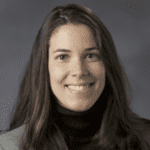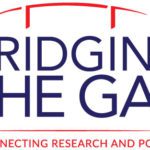Recent events make it clear: whether loved or loathed, government policies are central to our lives. That’s why public policy schools are devoted to understanding the causes, design, implementation, and effects of government policies. And it’s why some political scientists (including me) feel the pull to work in both a political science department and a policy school.
But if we make this choice, what goes from optional to required? For answers, look at Georgetown University faculty member Kate McNamara, the 2020 recipient of a prominent mentoring award from the International Studies Association. Kate exemplifies three requirements for political scientists in policy schools: 1) track down the policy insight, 2) learn from other disciplines, and 3) learn from practitioners.
Track down the Policy Insight
In policy schools, our work is a three-legged stool made of theory, evidence, and policy insight. Theory points to the deeper patterns explaining why things happen. Evidence is the careful tracing of how factors operate in various contexts. Policy insight means identifying levers that could alter behaviors and outcomes.
Scholars outside of policy schools sometimes focus on theory and evidence alone, leaving policy insight to others.
This three-legged stool can’t stand if any leg is missing. Think of what we need to overcome the current COVID-19 challenge: theory enables us to grasp broader regularities about this virus and human behavior, evidence ensures that our information is objective and substantiated, and policy insight helps us construct a response that’s not only desirable but also feasible. Scholars outside of policy schools sometimes focus on theory and evidence alone, leaving policy insight to others – but scholars inside policy schools cannot skip this crucial piece.
Learn from other Disciplines
In assembling theory, evidence, and policy insight, scholars who work in policy schools benefit from something very special: intense conversations with people from numerous academic disciplines. Instead of only facing one another, political scientists also face economists, historians, physicians, psychologists, sociologists, statisticians, and others. Policy school faculty share a desire to understand the world and make it better, but they aren’t bound to any one discipline’s style of research or set of assumptions. This diverse, exacting audience is a strong motivator for sharpening our arguments and presenting them plainly.
But the benefit isn’t just about becoming better at teaching others what we’re discovering; it’s also about becoming better at learning what people in other disciplines might already know. Sometimes, learning from other disciplines results in extensions (such as when political scientists use sociological ideas about learning to explain how governments form policy preferences). Other times, learning from other disciplines results in corrections (such as when economists use psychological findings about emotion to overturn their discipline’s assumptions about human rationality). But either way, it’s a synergy made more likely by the kind of intense cross-disciplinary discussions that policy schools cultivate naturally.
Learn from Practitioners
In addition to hosting discussions across academic disciplines, policy schools often host discussions between scholars and policy practitioners. Academic researchers sometimes grumble about practitioners who are unthinkingly partisan or who portray individual experiences as generalizable truths. But most policy scholars are eager to hear practitioners’ first-hand accounts – after all, such accounts can point to crucial but under-researched topics, or unearth exceptions to particular theoretical explanations, or offer clues about levers that alter behaviors and outcomes. It all comes back to the three-legged stool: by learning from practitioners, scholars can strengthen their work’s theory, evidence, and policy insight.
Kate McNamara as a Role Model
These three lessons – track down the policy insight, learn from other disciplines, and learn from practitioners – are things I embrace, and I push my students to do likewise. It’s a model exemplified by Kate McNamara.
Kate McNamara is an outstanding political scientist who has made her mark in both academia and the policy community.
During her nearly two decades at Georgetown, Kate has mentored countless students and junior faculty, both inside and outside of her own university. Instead of just telling young people what to do, she lives it: Kate is a superb scholar, a unifying force across disciplines, and an admired public intellectual. As a blogger and interviewee, she has disseminated her ideas through outlets such as Foreign Affairs, the Monkey Cage, and National Public Radio. As director of Georgetown University’s Mortara Center for International Studies, she has championed interdisciplinarity and policy relevance, as well as outreach to undergraduates and the public. As a top researcher on European integration, she has worked with and briefed policymakers in the Federal Reserve, the European Central Bank, and the National Intelligence Council.
Kate McNamara is an outstanding political scientist who has made her mark in both academia and the policy community. In days full of bad news, it’s uplifting to recognize people like her – people whose mentorship and personal example continue to knit together our educational institutions and our professions.
This piece is part of a short forum on mentoring in academic careers in international affairs, written to honor Kathleen R. McNamara, Professor of Government and Foreign Service at Georgetown University, as recipient of the Society for Women in International Political Economy (SWIPE) 2020 Mentor Award. Others posts in this series can be viewed here, here, and here.



0 Comments
Trackbacks/Pingbacks